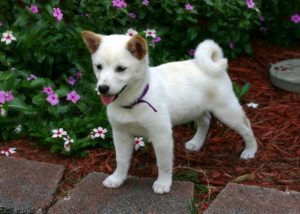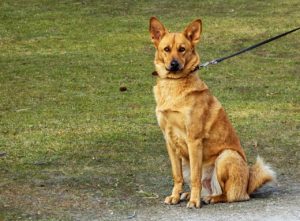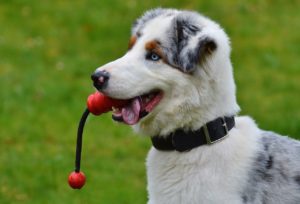Nutrition is of utmost importance when it comes to supporting your puppy’s growth and development of the immune system. Your puppy is going to change on a day-to-day basis so puppyhood is the most nutritionally demanding time in your dog’s life. The right food needs to support your puppy’s development. Choosing the wrong puppy food can cause serious health problems that are difficult, not to say, impossible to remedy later in your dog’s life.
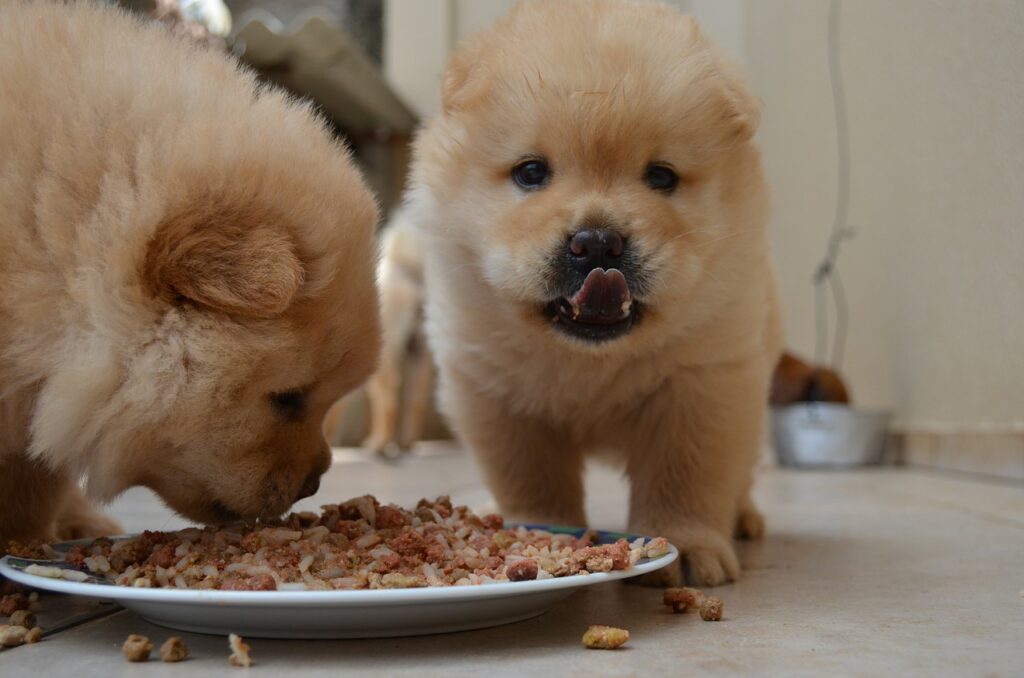
The nutritional aspect of puppyhood
As a general rule, a puppy’s nutrition can be explained by two main phases. The first is the fast growth stage which lasts for about the first 5 months of a puppy’s life. Then, the second stage comes with a slightly slower rate until your puppy reaches its mature weight. The growth pattern is slightly different when it comes to larger breeds because they reach their body size a bit later, some even when they get 15 to 18 months old. But whichever the breed, puppies grow very fast and therefore, have a higher requirement for protein, energy and calcium than an adult dog.
Special puppy food
Until your puppy reaches 50% of its adult weight, it will have around double the daily energy requirements of an adult. Along with the needed exercise, diet will have the greatest effect on your puppy’s bones and joints, size, shape, strength and cardio shape as an adult. Young puppies need to be fed a diet that has been specially formulated for their development, so it’s important to choose a diet that is labeled as being ‘for puppies’.
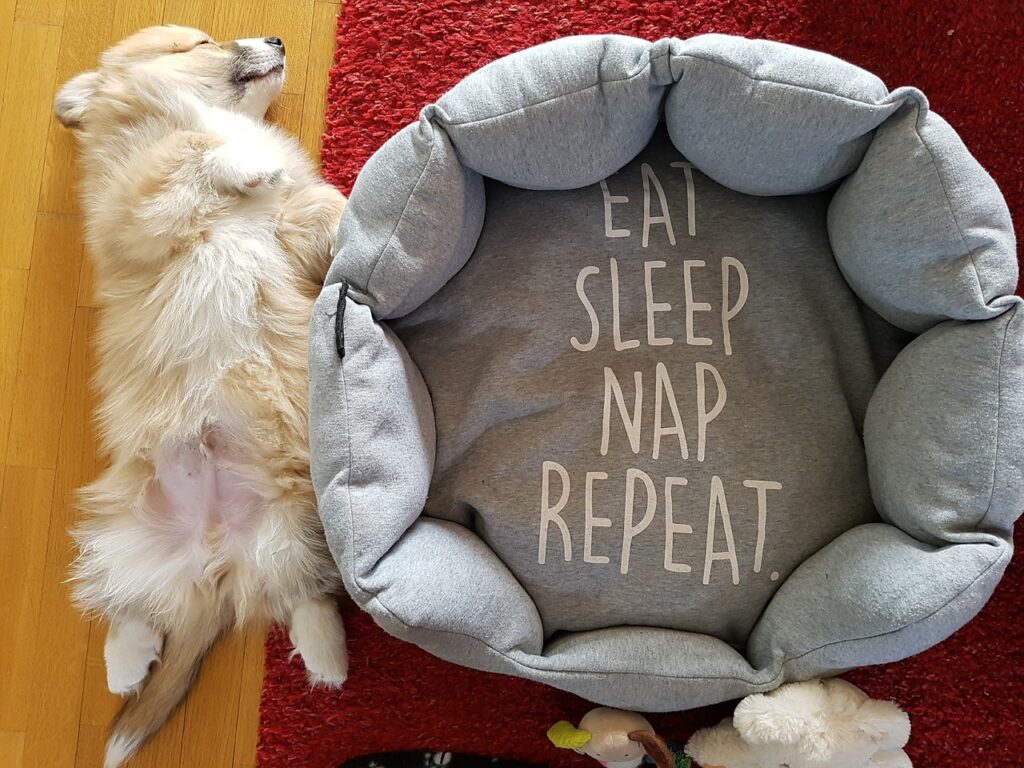
Each breed is different and each dog will have its own unique needs, this is where your vet’s input is of crucial importance. But the reasoning behind any good quality brand is something that you can benefit from understanding. The most important advice on how to choose your puppy’s food will be given by your vet. To help you with your research, we have selected (and tested) 5 super-premium brands that you can try giving to your dog. We have reviewed dry foods as suggested by vets since nibbling is good for your dog’s teeth and is overall considered as the safest bet for your dog’s health.
Acana and Orijen – Champion Petfoods
Acana and Orijen are sister brands from Canada. Champion Petfoods has an excellent reputation – there have been no complaints since it was founded in 1975. There are some posts online from people who found that their formulas have changed in the last couple of years but there is no proof of this. Both brands are super premium pet foods, but Orijen is perhaps the world’s most expensive brand. Also, you can purchase both brands in over 60 countries. This comes in handy if you are traveling with your furry companion since any sort of change would need to be implemented gradually and would make your life a bit more difficult.
So what’s the difference?
According to the company, both foods specialize in “biologically appropriate” diets made with fresh regional ingredients. Orijen has a higher meat protein content than Acana. It is made with 75 to 80% meat, whereas the percentage for Acana is 40 to 65% meat, depending on the specific formula. Orijen dog food formulas have between 38 and 42 % protein, while Acana formulas are in the 27 to 34 % range.
There is also a difference in carbohydrate levels. Orijen puppy food formulas fall in the range from 18 to 22 % and Acana is in the 28 to 30 % carbohydrate range. As for fresh meat, Orijen contains up to 40 % fresh meats whereas Acana’s percentage is drastically lower from 9 to 15% . There is also a difference in terms of variety. Orijen dog food is very rich in variety as it contains at least five fresh meats in one single meal, whereas Acana contains three fresh meat ingredients. Because of these small differences, Acana is priced slightly lower and is more affordable for some pet owners. But the quality of the ingredients is the same and sensitive dogs actually benefit from less variety.
As for puppy food, Acana has three lines:
Acana’s puppy food quality is not in question – it’s just a matter of protein % and variety
The quality seems good as the company states that its protein ingredients “pass for human consumption” and all of their ingredients are local to their area. Just because it is cheaper than Orijen, it does not mean it is of poorer quality. Some dogs might find protein-intense Orijen too much as it has above-average protein, above-average fat and below-average carbs when compared to a typical dry dog food.
Orijen is considered one of the super-premium foods that can enhance your dog’s optimum health throughout all of its life stages. Also, it is recommended for all sizes, from small to large breeds. If it’s too much for your budget, feel free to try Acana as it could prove to be even better for some dogs! Acana even has a ‘sensitive’ range in the cases where your dog is hypersensitive, allergic or intolerant to a specific nutrient. Unfortunately, allergies are getting more common due to higher frequency of vaccines and corticosteroid drugs that are often used to treat dogs.
Lilly’s Kitchen
Going organic can never go wrong – whether it’s a puppy or sensitive senior dog. The company states its puppy food is only real meat. No rendered animal parts or derivatives, nothing genetically modified, no artificial preservatives, colours or sweeteners. No wheat, corn or soya. They use only wholesome meats, grains, herbs – flowers and leaves, fruit and vegetables – to produce a delicious, digestible food for dogs.
Lily’s Kitchen Perfectly Puppy is made with chicken and salmon and consists of Protein 27%, Fat 14.5%, Fibre 3%, Ash 6%, Omega 6 1.96%, Omega 3 1.45%, Calcium 1.2%, Phosphorus 0.91%. But food sensitivity is a possibility, so although going all-natural from a commercial kibble sounds like a good idea, some puppies with sensitive tummies might not respond well to such a large variety of ingredients. And never forget the golden rule of altering your dog’s food. That’s especially important when it comes to puppies with their super delicate tummies!
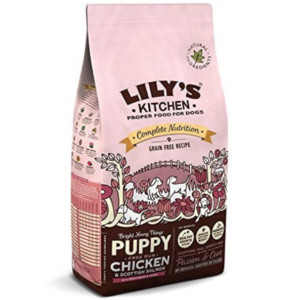
Hills
Although other brands score higher on the internet, a lot of vets advise Hills when it comes to puppies and adult dogs and there is a valid reason behind it. There are several types of puppy food to suit your dog’s needs:
Animal protein is decent, the protein and fat percentages are also near optimum levels. It does contain grains but the overall carbohydrate percentage is less than 40% and that’s very low for a commercial (non-organic) dog food. It does not contain probiotics, prebiotics, healthy herbs, etc. But then again, too many ingredients is not a good thing when it comes to food intolerance. Perhaps going simple and building the immune system slowly is what vets have in mind? It’s definitely worth discussing it over with your vet before you use Google as your number one guide.
So what should the best puppy food include?
Whichever brand you opt for, these are the ingredients you want:
- Chelated minerals for easy absorption
- Omega 3/omega 6 oil for healthy skin and shiny coat,
- Glucosamine and chrondroitin for healthy joints
- Probiotics and prebiotics for a healthy digestive tract
- Fiber for healthy digestion and firmer poop (anything but firm can eventually lead to anal sac nightmares!)
- Sufficient amount of calcium – Calcium plays a vital role in your dog’s diet. It not only contributes to building strong bones, but calcium also supports contractions in the heart muscle. This helps your dog’s heart to function. It also helps with hormone secretion and supports muscle building and nerve transmission. Recommendations vary, but 1,200 to 1,500 mg of calcium per pound of food should provide an adequate amount without giving too much. Puppies need more phosphorus than adult dogs so it’s best to use bone meal rather than plain calcium supplements.
Remember that protein is beneficial, but too much calcium or too many calories can lead to disaster. Keeping your puppy lean will reduce the risk of many problems in the future: bones and joints included . So, as always, consult your vet so you are sure you made the perfect combination for your pup.
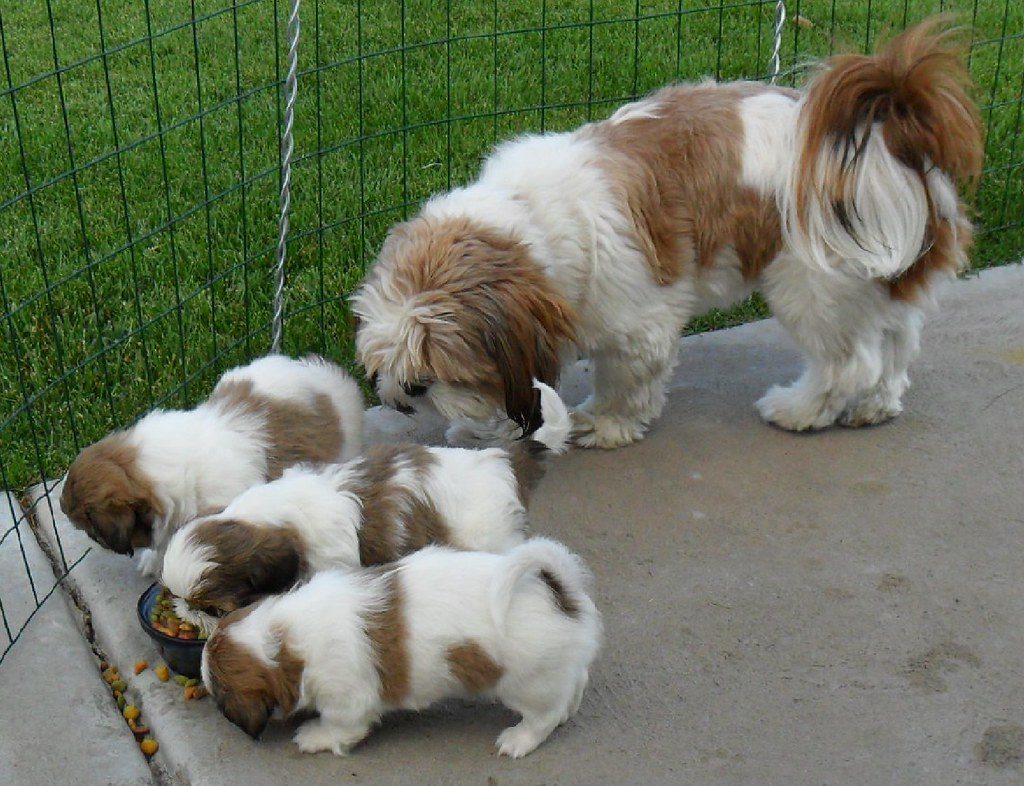
Don’t forget about TREATS!
Choosing the best food for your puppy is not an easy task. You also need to make sure that you get healthy treats full of naturally nutritious ingredients during training. A good example are Eden treats which come in a variety of flavours: duck, salmon, white fish, lamb and venison. All of those are filled with quality nutrients to support healthy digestion, joints, dental heath and fresh breath.
Eden is an organic food brand that was reportedly developed in consultation with vets and nutritionists. It claims to contain the best quality meats, fruits and vegetables, and is completely grain and gluten free. Eden Holistic’s mission is “Supporting animal health through nutrition” but they don’t have a specific puppy range as far as kibbles go. Its downfall is that its food is categorised to fit puppies, adults and senior dogs, all in one and vets prefer specific puppy labeled foods for a reason!
The debate… vegan dog food? Not for puppies.
There are some lines which are free of animal protein and this could be necessary for dogs with allergies. There is now even insect-based protein. But the fact is that animal protein contains all of the amino acids essential for dogs in the correct quantities for overall health. Plant proteins are missing vital amino acids such as arginine, taurine, methionine, lysine and tryptophan. Animal fats are a very important part of a dog’s nutrition, providing a source of essential fatty acids (EFA’s). We don’t recommend these vegan foods for puppies as they lack B vitamins, Calcium, Phosohorus and Iron. After your puppy becomes an adult, the choice is yours as vegan dog food does contain proven benefits. If you do want to switch to vegan dog food, do so only after consulting with your vet!
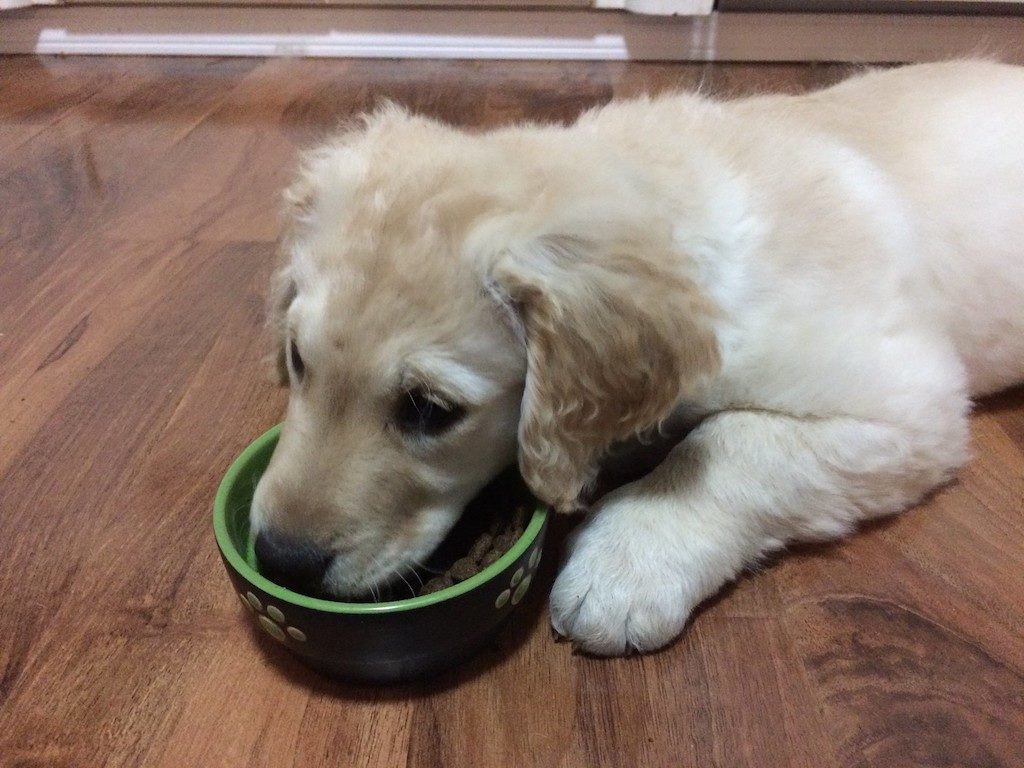
Puppy food is one of the most important considerations for your pup
The importance of quality nutrition cannot be emphasized enough. Above all, we recommend finding a holistic vet and listening to his guidelines. Your vet will also take care of cleaning your puppy of any possible intestinal parasites. But you play a big role in its hygiene. Make sure you clean your puppy’s ears, eyes if they tear up, mouth (teeth), intimate parts and paws. Also, make sure you regularly brush your puppy’s teeth as all these habits need to be formed as early on as possible. Another option is to follow the puppy diet recipes in Dr. Pitcairn’s Complete Guide to Natural Health for Dogs & Cats but make sure that you take your dog to the vet regularly so they can see if your puppy is developing in the right direction.

